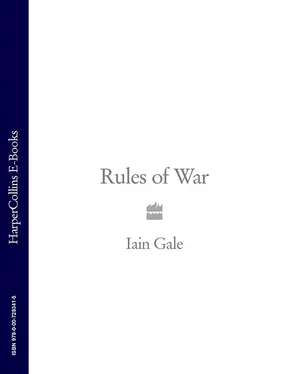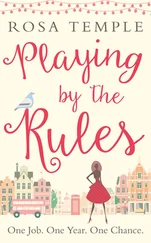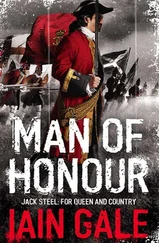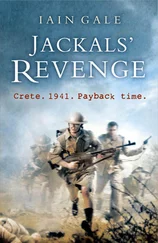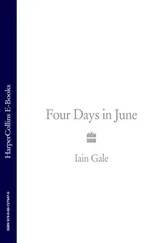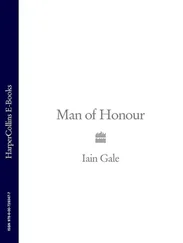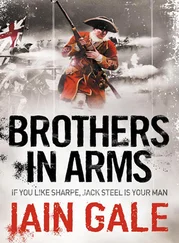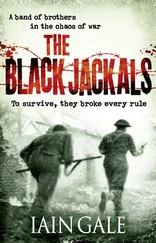Cussiter spat into the fire: ‘It was the cavalry that decided it, weren’t it, Sarge. Never seen such horses. Crashed into the French like a blade goin’ through the corn.’ He gesticulated with his hand, as if to sever Mackay’s head.
Mackay backed away and laughed: ‘Cavalry or whoever it might ’a been, it was the general as won that battle an’ that’s the truth. It was Marlborough. Our own good Corporal John.’
Now Slaughter spat at the fire, making it hiss as the fatty gristle hit the flames. ‘’Tweren’t cavalry. ’Tweren’t even Marlborough, though he’s as good a general as ever I served under. What won that battle was the men. Plain and simple, lads.’ Twere you and me won that battle and don’t you ever bloody forget it.’
* * *
Steel, dismounted now, wandered among the men, nodding greetings to those he recognized in the gloom. He scratched at the filthy rag wrapped around his neck and dreamed of a bath. At least as the victors there were such pleasures to look forward to. They would advance, he presumed, to Brussels. It seemed the clear objective. Where after that though, he wondered?
He found Slaughter standing on his own, staring into the embers. ‘So, Jacob, tell me where you think we’re bound after this great day?’
‘Well, sir. If I were the great duke his self, I would want to catch the rest of the Frenchies. So I would make for Brussels and by that cut them off.’
‘By God Jacob, we’ll make a general of you yet.’ He saw Williams: ‘D’you hear that Tom? General His Grace the Duke of Slaughter here would have us march on Brussels and catch the enemy running for home.’
Williams laughed. ‘That would be a fine thing, sir.’
Slaughter grinned: ‘Thank you indeed, sir. But I think I’ll stick to being a sergeant and let His Grace make the decisions.
‘Nevertheless, I think you may be right, Sarn’t. But I also believe that Marlborough intends us to push the French from the Netherlands once and for all and to do that he will have to take the remaining forts. Everything from Malines and Ghent to Bruges, Oudenarde and Antwerp. They will be our next objectives.’
‘Not more ’sieging, sir?’
‘I believe so. And I know how you enjoy it, Jacob.’
Slaughter spat into the flames. The Grenadiers that could hear him laughed. Brave as he was in battle, the sergeant was known for his enjoyment of home comforts and in particular, on the right occasion and with due propriety, of pretty women. And if there was one thing he was unlikely to find in the siege lines around a fortress it was a willing harlot. And then there was the question of his extreme dislike of enclosed, dark spaces, and there were always enough of those in a siege. It was the reason he had joined up in the first place, to be away from what life he might have had in the new coal mines around his native Durham. Slaughter cursed and spat again.
Steel, gazing into the fire, could not help but recall the words of Colonel Hawkins in Ramillies: ‘I shall have need of you ere long.’ But how long, he wondered, would that be?
Had he only known it he could have had that answer quicker than he thought. For barely four hours later, less than half a mile away from Steel, close to the village of Meldert, a man was waking up with a mind filled with such thoughts. Having spent the night wrapped in his cloak by the roadside, James Hawkins was attempting to drink a cup of coffee. Attempting, because his servant, Jagger, had sworn to him that it was real coffee and he did not wish to hurt his feelings. But to Hawkins it smelt more like the swillings of a Flemish alehouse. Still, it was something, more than was to be had by most. Orkney, he knew, had not eaten for a day and perhaps Marlborough too. He had not woken in the brightest of spirits. But with the recollection of how complete their victory had been his aches and tiredness had gone. Now, as he drank, his mind raced with the prospect in hand. They must surely exploit this initiative over the French, but subtly and with no little care. Looking about him through the dawn, he saw a few yards off the distinctive figure of Marlborough, together with a few servants and several of the general staff. Hawkins handed the half-empty cup to Jagger and then, seeing how crestfallen the poor wretch looked, decided to keep the brew and went to join them.
Adam Cardonnel, Marlborough’s personal secretary, was speaking animatedly and waving a piece of paper. ‘Everything is yours, Your Grace. We have taken eighty standards; fifty cannon, tents, baggage, the food still hot together with muskets without number and prisoners by the score. Lord Hay’s dragoons alone have captured two entire battalions of French foot. The Walloons are coming over to us by the hour. We are hard pressed to keep them safe, My Lord. The Danes would have revenge upon them for their treatment in Italy last month.’
From the duke’s left Cadogan spoke up, quietly: ‘By my reckoning, sir, the French have lost near on thirteen thousand men, but some put it at near double that number, if we include the deserters and turncoats.’
Cardonnel spoke again: ‘My Lord, we have even taken their famous negro kettle drummer of the Bavarian Horse Guards. Have I your permission to dispatch the man to the queen in London, sir? He would make her an elegant servant and a true prize.’
Marlborough smiled and nodded: ‘Indeed, Adam. Send the blackamoor to the queen. That was a fine thought. Though in truth, I’d have liked to keep him as one of my own servants.’
The company laughed, glad of the lightness at last in the duke’s voice. Like Hawkins, Marlborough had passed a restless night, having had only his cloak for a cover. He had slept badly and for company in his rustic bed had had only the tiresomely enthusiastic and over-opinionated van Goslinga who punctuated the night with anecdotes of the battle. Happily though, one of the footmen had found some chocolate in the French generals’ supplies and Marlborough now cradled the hot, richly aromatic liquid in the silver-mounted cup made from a coconut which he always carried in his personal baggage. As the laughter subsided, Cadogan spoke again.
‘Our own losses are light, Your Grace. Two colonels only killed and two score other officers and but a thousand men dead in all. It is a triumph. They will praise you throughout the realm, Your Grace. Your enemies in London had thought that the only news they would hear these few months would be from My Lord Peterborough in Spain. But now you have proved them wrong once again.’
Marlborough smiled and took a sip of chocolate, which he had not offered to any of his generals. They did not expect it, such was his reputation for parsimony. For, if Mar-lborough was renowned for his care in his treatment of the soldiery he took equal pains to keep certain things purely to himself.
Hawkins sipped again at his own acrid brew and winced and looked with envy at the steaming cup in the commander-in-chief’s hands.
Marlborough put it down and spoke: ‘My Lord Peterborough may indeed prosper in his Spanish campaign, for it is there that his friends the Tories believe this war is to be won. But we know better, gentlemen. We know that if we beat the French here, in Flanders, then we shall send a shock through that misguided nation deeper than anything Peterborough may achieve. Perhaps now those in London will do as I ask and replace him with Lord Galway.’ He picked up the cup, took another sip and continued: ‘Their losses are not as great as they were after Blenheim, gentlemen. But I fancy that the effect is ten times as tumultuous.’
He looked at each of them in turn. ‘But what now? Eh? What will the Sun King send against me now I wonder? We have the summer ahead of us and a campaign to conduct, at our leisure. We must make best use of that which God has provided.’
Читать дальше
